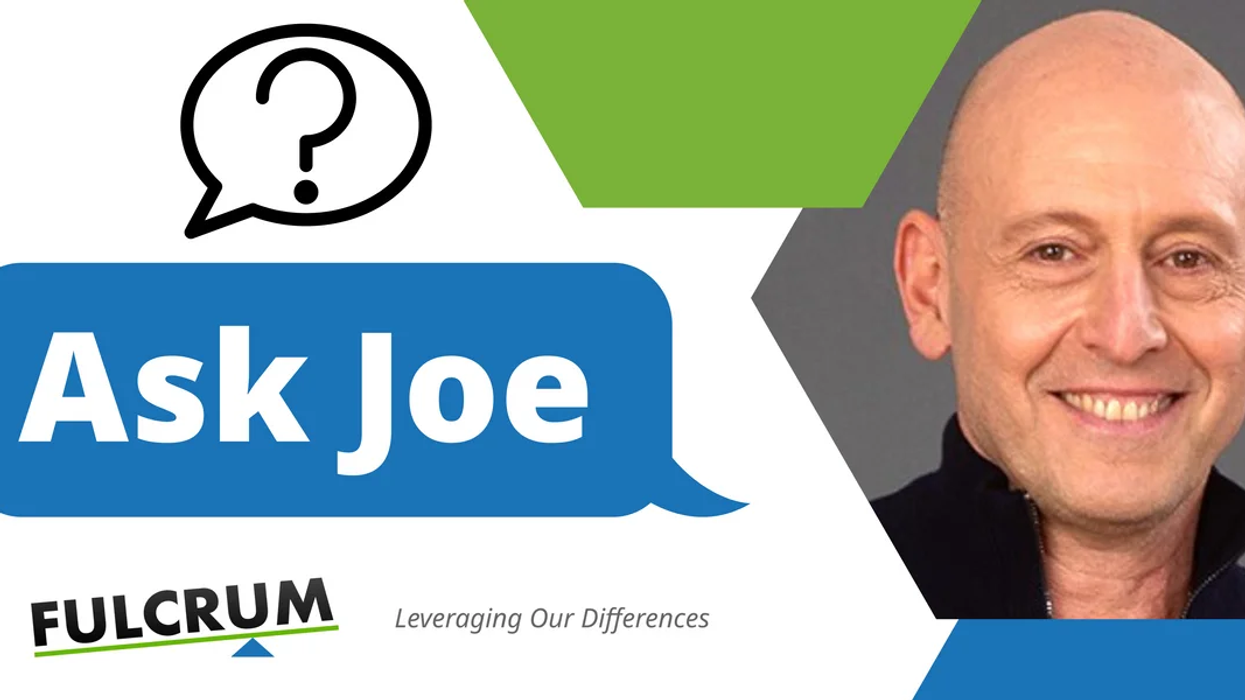Hello, Joe
I read your last article and found your tips for the holidays with family helpful, but I’m having trouble with your suggestion that we don't “offer opinions and declarations of condemnation.” There are terrible things happening. We need to say something, don’t we? Are you suggesting I sit back and let them happen?
Doubtful
Hello, Doubtful.
I appreciate your question. I can feel your passion and desire to be of service. Thank you for that. If you are already doing things that can help those in need, please keep doing what you are doing!
In all of my work I mostly focus on the “how” more than the “what.” Yes, of course there are injustices and great harm being done to people, and I am trying to “do” what I can to alleviate some of that suffering. And in the process of finding ways to offer support, I am also taking time to make sure that my words and assertions don’t create more animosity and hatred.
As I mentioned, I had been working for years with different women’s rights organizations in Israel and the Palestinian territories, as well as other countries in the region. One thing I learned is that the problems in that region are so complex that it is impossible for any of us to fully grasp them. I also remind myself that, like with other conflicts in the United States and various parts of the world, the issues are so multifarious that I don’t believe:
- It is clear-cut who the victim is and who is the perpetrator.
- There is one right answer to the problem and all other answers are wrong.
- That if one side “wins” and the other side “loses,” the problem will go away.
These statements are not necessarily meant to be used in your expression of your views or debates about current events, Doubtful, but more as your own internal practice to ensure you don’t get stuck in the familiar patterns of fighting or defending your viewpoints. Instead, being informative, respectful and reflective, while at the same time challenging, is likely to lessen separation and opposition with those you will be spending time with this holiday season. They are designed to inspire you to activate being the nurturer and protector. And when integrating both fierceness as well as civility, being a nurturer and protector doesn’t exclude the use of force if that is the only option available. The motivation of a protector is different from that of a fighter.
I start chapter one of my book “Fierce Civility” with a quote from Eleanor Roosevelt that she shared in an early 1960s speech, when the world was on the brink of a nuclear world war:
“We have to face the fact that either all of us are going to die together, or we are going to learn to live together; and if we are to live together, we have to talk.”
This for me is a strong warning for what happens when we don’t consider the consequences of our words and approaches to serious issues – the “how.” Here we are, more than 60 years later, and I would take it a step further:
In a world that is so interconnected and interdependent (whether we are aware of it or not, or whether we like it or not), we either ALL win, or we ALL lose.
In my previous article, Doubtful, I suggest that instead of offering opinions and declarations of condemnation, what we need at this time is to find ways to offer nurturing and protection. The world is filled with enough fighters and defenders; we need more nurturers and protectors! And for me, nurturing and protecting is not passive. In fact, with so much suspicion, cynicism and animosity, it takes great courage and resilience, maybe even heroism, to actively nurture and protect others – to those you love, to strangers, and maybe even to those you consider adversaries.
I’d like to offer a way to shift patterns when you find yourself in tense or challenging situations, pivoting from fighting and defending to staying connected with curiosity and compassion, and consequently appealing to the humanity of others:
First notice that you are activated, and find a way to restore some sense of internal balance. Then ask yourself these thre questions:
- “Is one side 100 percent all good and is the other 100 percent all bad?”
- “Do I want to be right or do I want to be effective?”
- “Do I want to win, or do I want to co-create new emergent solutions to our problems?”
These questions are designed to help you pivot from a more oppositional stance to one of connection and collaboration. It takes practice to be able to call on this in the heat of the moment. If this resonates with you, I lay out in more depth various skills and strategies in my book.
Remember, Doubtful, that my last article offered suggestions on how to more peacefully navigate the holiday times with people who may have different viewpoints on world events. Imagine adding these principles as a way to make the time with friends, family and colleagues more nourishing.
Wishing you great ease and peace during the holiday time,
Joe
Have a question for Joe? Send an email to AskJoe@fulcrum.us.
Learn more about Joe Weston and his work here.




















Trump & Hegseth gave Mark Kelly a huge 2028 gift